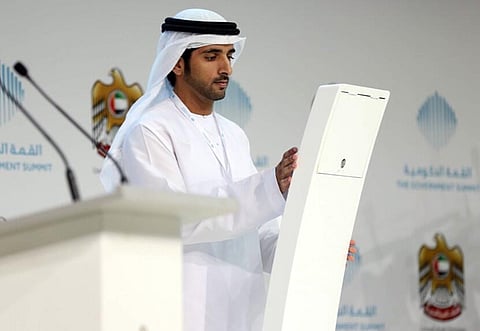Sheikh Hamdan approves work-from-home system at Dubai government
Move to help harness technological innovations in creating a lean work environment

Dubai: Sheikh Hamdan bin Mohammed bin Rashid Al Maktoum, Crown Prince of Dubai and Chairman of the Executive Council, on Thursday approved the work-from-home system at Dubai government to empower human resources to cope with changes and strengthen Dubai government’s leading position.
The move is in line with the decision of His Highness Sheikh Mohammed bin Rashid Al Maktoum, Vice-President and Prime Minister of the UAE and Ruler of Dubai, to harness latest technological innovations in creating a lean work environment that meets the requirements for future job opportunities and reflects positively on employees.
“Remote work is one of the solutions that proved successful in maintaining the sustainability of business during the COVID-19 pandemic. It is a flexible system that enables an employee to discharge his tasks and helps him be more creative,” Sheikh Hamdan said. He added that the new phase requires new tools and a new way of thinking at government entities, which will reflect on the productivity of employees and their positive influence at work.
“We are working to enhance the leadership of the government work system in Dubai. Our government embraces the future and constantly strives to find proactive solutions to challenges. We have the potential to strengthen our preparedness and harness the tools that support our forward approaches and focus on making the best use of opportunities."
The remote work system has been approved in line with the requirements of the future jobs, where the employee can perform his duties from anywhere, using communication and information technology.
The remote work policy aims to create multiple and flexible work systems that cope with the government’s forward-looking approaches and comply with the best international practices.
The system also aims to enhance institutional agility by giving the necessary flexibility to each party to manage its operations, provide its services and carry out its tasks according to its operational nature in a manner that contributes towards increasing its efficiency and effectiveness, preserving its human resources and achieving a better alignment between the employee's working hours and his life requirements, thereby ensuring the sustainability of business in emergency situations.
Abdullah Ali Zayed Al Falasi, Director General of Dubai Government's Human Resources Department, said: “We are keen to implement Sheikh Mohammed’s vision for enhancing the government efficiency by investing in human resources and developing their capabilities to uplift the government's performance and be well-prepared for future jobs."
Al Falasi referred to the successful experience of remote work that took place between mid-March 2020 and mid-June 2020, which was approved as part of the precautionary measures to stem the spread of the COVID-19 pandemic. “The experience was a resounding success as Dubai government departments succeeded 100 per cent in applying the work-from-home system. The performance rates were very high and things went normal. This has encouraged the application of the remote work system in normal conditions," he said.
Each department’s director general is mandated to issue an internal system to regulate the mechanism of commissioning an employee to work remotely in accordance with the requirements of the job. The decision also gives directors-general and direct-line mangers the power to assign employees to work remotely.
Under the new rule, the director-general of a government agency is authorised to allow an employee to work remotely from outside the country in emergencies that arise abroad, in which it is difficult for the employee to return. Working remotely from abroad shall neither affect the department’s productivity nor the employee’s performance. The remote worker shall take into account the security and confidentiality of information. The employee's performance and productivity should be monitored during the period of remote work.
Sheikh Hamdan’s decision stipulates that the employee assigned to work remotely must comply with the laws and regulations in force in the emirate of Dubai and the regulations of the government agency. A government employee must maintain the confidentiality of information and data, in addition to the tasks undertaken remotely.
Government employees assigned to work remotely are entitled to salaries, bonuses, benefits and allowances stipulated in the Dubai Government Human Resources Law and its related resolutions.







